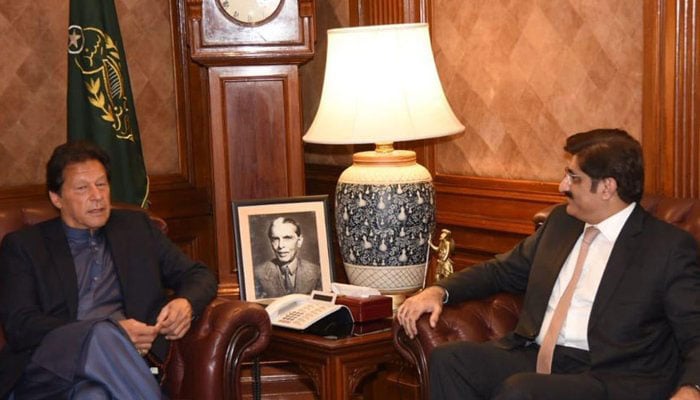In a time of pandemic, a call for unity, co-operation and some faith
Trust between the government and its citizens is vital in a time of crisis
March 28, 2020

The solemn firing of cannons on Pakistan’s National Day sounded a much-needed call for the nation to come together. This is not the first time that the collective determination of Pakistan has been put to test. In the last few years, Pakistanis bravely came together to try to eliminate the virus of terrorism. Today, a similar shared sense of purpose is required to contain and eliminate the dangers posed by an invisible enemy.
On the National Day this year, there was little in the way of ceremony or pageantry. Troops and civilian institutions did not mark the occasion with parades, seminars or public celebrations. Instead, thousands of military personnel, doctors, police officers and volunteers steeled themselves to assist the government in enforcing measures designed to suppress the spread of the virus.
Prime Minister Imran Khan used his National Day address to urge people to be courageous. He promised: “If our nation imposes self-discipline and self-quarantine similar to the measures taken by the Chinese, we will definitely emerge successful.”
Read also: A tale of two captains
The Chief Minister of Sindh Murad Ali Shah was among the first regional leaders to impose strict measures. Meanwhile, the authorities in Punjab, home to over half of Pakistan’s 207 million population, have ordered citizens to remain at home, unless they require food or medical care. Still, the Center was hesitant to impose a nation-wide lockdown.
“Twenty-five per cent of Pakistanis are below the poverty line,” the premier said in his televised address, “If there is a complete lockdown then my country's rickshaw drivers, pushcart vendors, taxi drivers, small shopkeepers, daily wage earners – all of them will be shut in their homes.”
But there are other problems, Prime Minister Khan is facing while tackling this pandemic.
Trust between the government and its citizens is vital in a time of crisis. Yet in Pakistan, it is in short supply. Politically, due to a lack of an absolute majority, the prime minister’s powers are limited. Any major decision requires support from a diverse set of political allies.
Then there is corruption, which also undermines trust.
As an opposition leader, Khan promised to battle corruption. Pakistan’s National Accountability Bureau was specifically established in the Musharraf era to deal with this issue.
However, the performance of the NAB is patchy and it often appears to be coerced into attacking the opposition and the media. The recent arrest of Jang Group’s Editor-in-Chief, Mir Shakil-ur- Rahman, is an example of the misuse of authority to silence legitimate voices of dissent.
Read also: Pakistan on the edge of the precipice
All these factors combined, make it difficult for the prime minister to take strong measures and to take them quick.
Meanwhile, in order to help poor countries tackle the pandemic, the South Asian Association for Regional Cooperation (SAARC) has announced an emergency Covid-19 fund, to which India has committed a contribution of $10 million, Sri Lanka $5 million, Bangladesh $1.5 million, Afghanistan and Nepal $1 million each, Maldives $200,000 and Bhutan $100,000, bringing the total to $18.3 million.
Before committing funds, Pakistan has requested clarity on how the money will be used and under whose supervision will they be disbursed. If India has responsibility for the money, then there is a real danger of political or territorial issues affecting the spending decisions.
Money aside, people also need help to get through a global lockdown. Dr Khalida Tareen, professor emeritus at the King Edward Medical University in Lahore recently said that stress and anxiety increases in a situation where the whole nation is living through a pandemic. “It is important that despite restrictions on movement, individuals keep to a set routine in their homes,” she added, “share their feelings with family members and communicate more often using electronic means.”
And for those in isolation, Professor Tareen sends a reminder that it is important to focus on positive things and to manage anxiety so as to remain calm and make wise decisions. She also says: “Faith in God is a source of courage and comfort in these difficult times.”
Here is to hoping Pakistan wins the war against coronavirus, like it did against terrorism.
Siddiqui is a London-based analyst on South Asia. He tweets @SiddiquiAftab
Bartlett is former BBC World Service Asia Correspondent and the Editor of Asian Affairs magazine












